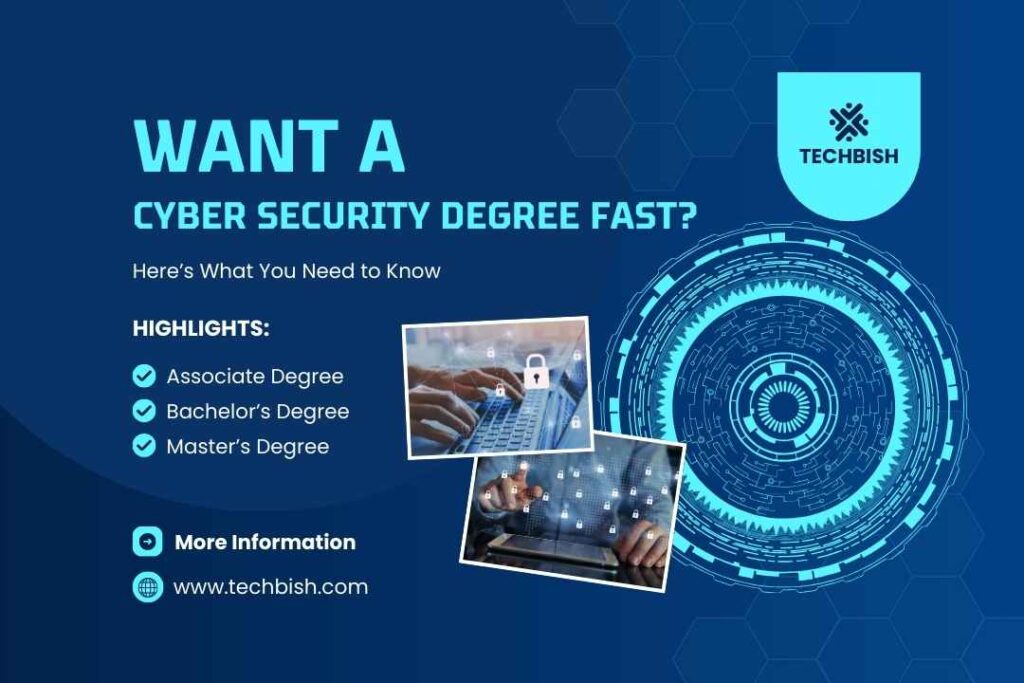In today’s digital world, cyber threats are increasing, and businesses need skilled cybersecurity professionals more than ever. If you’re looking to get a cyber security degree fast, you have multiple options, from accelerated programs to online degrees. But how do you choose the right path? And how long does it take to get a cyber security degree? This guide will walk you through the fastest ways to earn your degree, career opportunities, and what to expect from different educational paths.
How Long Does It Take to Get a Cyber Security Degree?
The time required to earn a cyber security degree depends on the type of program you choose:
1. Associate Degree in Cyber Security (Approx. 2 Years)
An online cyber security associate degree typically takes two years to complete and provides foundational knowledge. This degree is best for entry-level roles such as IT security specialist or network administrator.
2. Bachelor’s Degree in Cyber Security (Approx. 3-4 Years)
A cyber security bachelor’s degree usually takes four years, but accelerated programs can shorten this to around 2.5 to 3 years. This degree qualifies you for higher-paying roles like security analyst or penetration tester.
3. Master’s Degree in Cyber Security (Approx. 1-2 Years)
For professionals looking to specialize further, a master’s degree in cybersecurity can take 1-2 years and lead to advanced positions like cybersecurity manager or chief information security officer (CISO).
4. Online Cyber Security Degree Options
If flexibility is a priority, an online cyber security degree allows you to learn at your own pace, often accelerating the process. Some online programs offer fast-track options that allow completion in as little as 18 months.
Fastest Ways to Get a Cyber Security Degree
If you want to complete your cybersecurity education quickly, consider these strategies:
1. Enroll in Accelerated Degree Programs
Many universities offer accelerated bachelor’s and master’s programs that allow students to complete courses faster than traditional degrees.
2. Take Online Courses with Flexible Scheduling
Online programs let you study at your convenience, allowing faster completion. Schools like Western Governors University (WGU) and University of Phoenix offer self-paced cybersecurity programs.
3. Earn College Credit for Experience
Some universities provide credit for work experience or industry certifications (like CompTIA Security+ or CISSP), reducing the number of required courses.
4. Choose Bootcamps or Certificate Programs
Cybersecurity bootcamps, such as those offered by Coursera, Udacity, and Flatiron School, provide fast-tracked education (usually 3-6 months) for individuals looking to enter the field quickly.
Pros and Cons of Fast-Track Cyber Security Degrees
| Pros | Cons |
| Faster entry into the workforce | Intensive course loads |
| Flexible online learning options | May lack in-depth knowledge compared to traditional programs |
| Opportunity to earn while learning | Accelerated pace can be challenging for some students |
Career Opportunities with a Cyber Security Degree
After completing your cyber security degree, various career paths open up, including:
- Cyber Security Analyst ($85,000+ per year) – Protects systems from cyber threats.
- Penetration Tester ($100,000+ per year) – Identifies system vulnerabilities through ethical hacking.
- Security Engineer ($90,000+ per year) – Designs and implements security measures.
- Chief Information Security Officer (CISO) ($150,000+ per year) – Oversees an organization’s cybersecurity strategy.
Conclusion
Earning a cyber security degree fast is possible with accelerated programs, online learning, and credit for experience. Whether you choose an associate, bachelor’s, or master’s degree, cybersecurity is a high-demand, high-paying field with excellent job security.
If you’re serious about a cybersecurity career, explore fast-track degree options today and take the first step toward a secure future!
Comment below with your questions or share this article with someone who might find it useful!










